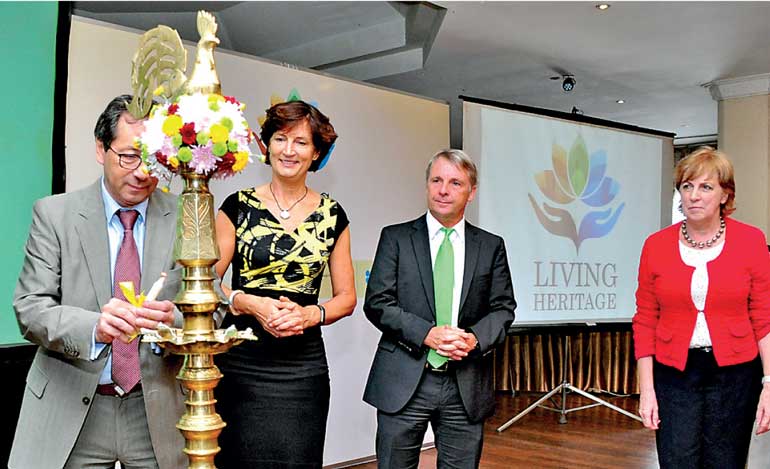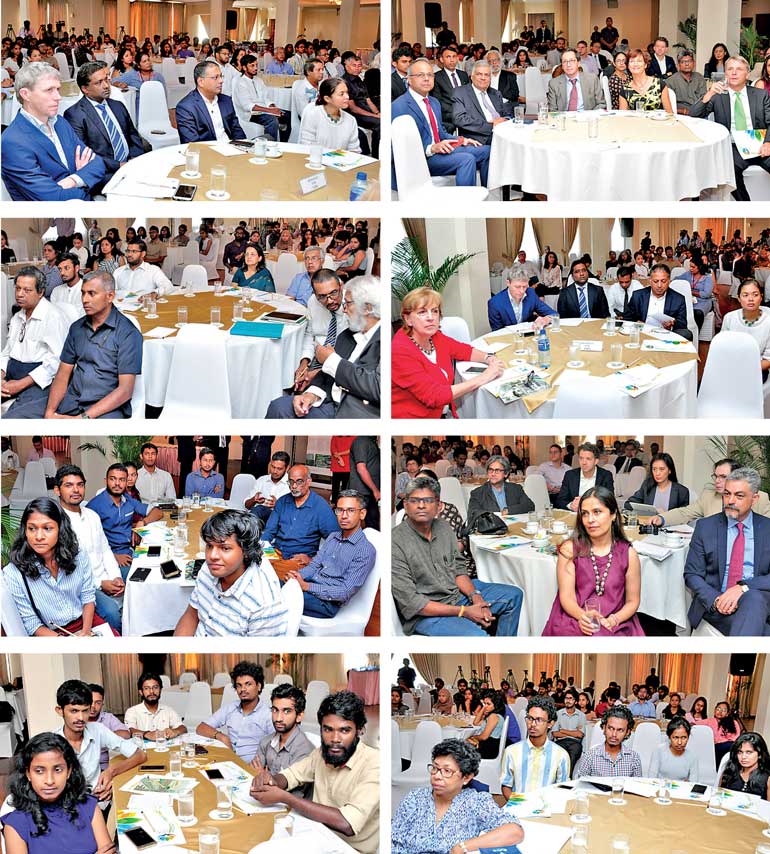Thursday Feb 26, 2026
Thursday Feb 26, 2026
Thursday, 14 December 2017 00:00 - - {{hitsCtrl.values.hits}}


 By Shannon Jayawardena
By Shannon Jayawardena
With the aim of preserving and restoring Sri Lanka’s fastest moving city Colombo, the annual Living Heritage Seminar, a two-day series of events kicked off yesterday under the patronage of Prime Minister Ranil Wickremesinghe.
The event is a collaboration between Sri Lankan and European architects, the European Union, the German Embassy, the Netherlands Embassy and the British Council. Their overall goal is to address the challenge of imagining and building the city of tomorrow while valuing and readapting the past.
Chief Guest at the event Prime Minister Wickremesinghe said: “The history of buildings in Sri Lanka commences from the beginning of Thuparamaya. Sri Lanka’s first stupa is known as Thuparama. From that time on, a developed civilisation developed in our country which was centred on Rajarata. Also, from the Dambadeniya era to the British era there are many buildings in the south of Sri Lanka. We must protect all those buildings.
“Most of the buildings in the Colombo Metropolitan area are built with the Dutch and British outline. In the past, Sri Lanka introduced modern commerce to Asia. In pursuit of the Roman Dutch law, the Europeans carried out their trade centred in Sri Lanka. Until the 1960s, Sri Lanka was considered as Asia’s main country. At that time most of the buildings that were built in Sri Lanka were still in good shape. Hence it us our duty to preserve these landmarks.
“Colombo has a lot of architecture and it’s a rich heritage of buildings. There’s much more such as the Galle Fort which is a heritage of the Dutch era which is the oldest functional Dutch Fort and wherever you go you will find buildings of the European heritage in this country. These are the heritages that need to be preserved. These being the living heritages of Sri Lanka is what we need to ensure is utilised and preserved as a part of our tourist industry.”
“Therefore the Sri Lanka Tourism Development Authority and the Central Cultural Fund has been asked to identify these buildings as to how we are going to preserve them. We have already seen some of them converted, like the Dutch House, Galle Face and Queen’s Hotel which are from the early centuries. We may not have all of them in one place but preserving these buildings is a task that we need to undertake. There are some students from the Architecture faculty of the Moratuwa University present at the event and we will fund them so they could make a list of the heritage buildings in the country,” he added.
He further said that the Government hoped to protect all the buildings of the past and make a new value today. He asked that the people re-educate Sri Lanka on how to survive and learn from the lessons of the past and the people who were not scared of the trade and make the country a re-open economy.
While urbanisation is one of the biggest challenges that Colombo is facing at the moment, finding the balance between the cultural past and the innovative present also plays a vital factor when preserving the living heritage of the city.
By this means the seminar also hopes to promote the development of an inclusive conservation and urban planning framework, engage authorities to map the historic districts in Colombo to establish a clear sense between authorities, developers and the local inhabitants on what should be preserved, what could be readapted and which areas could be redeveloped and work with the government to initiate work to look at the streamlining of processes for applications for development and adaption.
To stimulate commercial interest in re-adaption of heritage through public awareness programs, exhibitions, contribute to improving the urban environment, with a view of improving the experience of living in the urban environment, encouraging private investment and maximising potential for tourism are the other objectives of the juncture.
Speaking at the occasion, Delegation of the European Union to Sri Lanka and the Maldives Ambassador Tung-Lai Margue stated that: “Colombo has a rich and diverse heritage and there are many sites of natural beauty, sites of man-made beauty, sites that speak of the soul of this city and sites that show the interaction between Europe and Sri Lanka. It has a shared history and one in which many of the physical aspects speak of both Europe and Asia. We however continue to face challenges to find the equilibrium between conservation and development.”
He added: “I hope there will be thought provoking and awareness raising aspects that proves policy makers to find the path as to what more could be done to create the right incentives and balance as well as inspire students and activists to engage for these grounds.”
The event will also give its participants, policymakers, professionals, interested civil society and students the opportunity to interact on the challenges of preserving and re-adapting Colombo’s heritage.
While the seminar invited speakers from both Asia and Europe to speak on topics such as how to manage historic city centres and heritage based development, a series of interactive events will be organised in the afternoon on both days, including guided walks and expert-led workshops on current and cutting edge issues of heritage from the two regions.
Living Heritage in parallel with its centre seminar has prepared a video conference on cutting-edge virtual heritage promotion, visit to the railway warehouses at Maradana from 2:30 p.m.-3:30 p.m. and a Colombo Museum tour from 3 p.m.-4:30 p.m. on 13 December while a workshop on the conservation in South Asia and a Lunuganga walk from 3 p.m.-5 p.m. is to take place on 14 December.
Pix by Lasantha Kumara